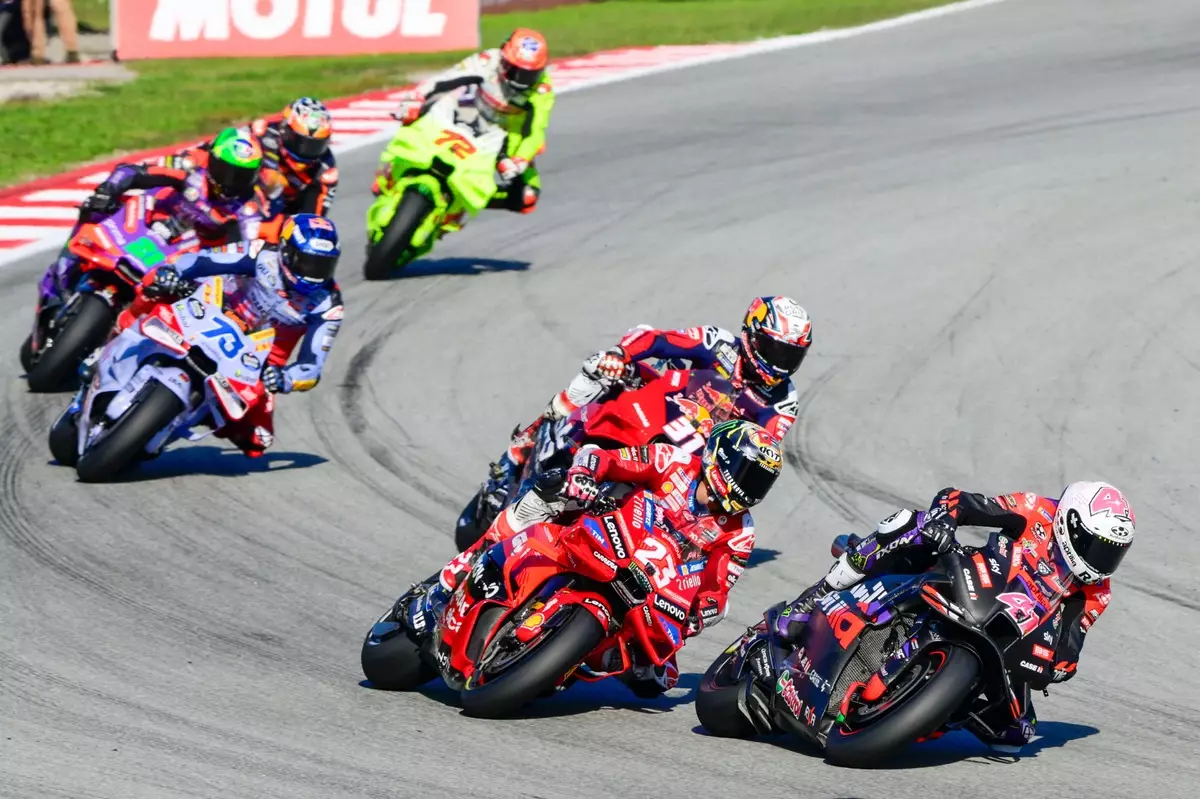MotoGP consistently delivers high-octane racing and intense rivalries, but the drama that unfolded during the Barcelona Grand Prix added a layer of controversy that sparked debate among fans and pundits alike. Central to this discussion were two prominent riders: Enea Bastianini, representing Ducati, and Aleix Espargaro from Aprilia. Following the race, emotions ran high as Bastianini publicly criticized Espargaro’s tactics, alleging that his rival had prioritized his friendship with Jorge Martin over fair competition during a pivotal moment in the championship.
The Barcelona Grand Prix posed a critical challenge for championship contenders. Bastianini started the race from a promising second position, while Espargaro, despite a lackluster start, settled into a position that allowed him to act as a rear guard for Martin, who was in a tense battle with Francesco Bagnaia for the championship. As the race unfolded, Bastianini, desperate to claw back points and maintain his status as a title challenger, engaged in several attempts to overtake Espargaro. However, the Aprilia rider’s aggressive and strategic defense seemed to prioritize Martin’s title aspirations over competitive racing, leading to frustration on Bastianini’s part.
The dynamics of racing are often shaped by relationships within the paddock. While it is not uncommon for riders to help teammates or close friends, the implications of such alliances can cast a shadow on the principles of fair competition. Bastianini’s assertion that Espargaro’s actions were unprofessional calls attention to the ethical dilemmas that arise when personal relationships potentially conflict with race day strategy.
Bastianini didn’t hold back when discussing Espargaro’s performance, stating bluntly that he felt his rival had effectively sabotaged his own race. “I lost so much time with Aleix today… He did all the race for Martin,” Bastianini lamented. These comments signal a deeper concern regarding the respect and integrity maintained among competitors, particularly when stakes are high. Such frustrations are common in competitive sports, but they illuminate the fine line between camaraderie and unsportsmanlike conduct.
Conversely, Espargaro defended his actions by emphasizing that he was not deliberately impeding Bastianini but was instead focused on protecting Martin, describing the latter as a “little brother.” He argued that the intensity of the racing conditions and the duels on the track—most notably against Alex Marquez—were clear indicators of his commitment and competitive spirit. “I was riding over the limit… trying to protect him as much as possible,” Espargaro insisted, pointing to the inherent challenges of racing and the intensity of competition among riders.
The rift between Bastianini and Espargaro highlights broader questions about the integrity of championship racing. As the MotoGP season progresses, the viability of fair competition comes under scrutiny when personal loyalties begin to overshadow the objective of racing. Should riders prioritize their friendships over their competitive integrity? This scenario opens up a Pandora’s box of dilemmas regarding sportsmanship, loyalty, and the spirit of competition.
The fact that Espargaro was competing in what he described as his last full-time race added a layer of complexity to the situation. Athletes often become emotionally invested in their relationships and roles within their teams, but what happens when this emotional investment may detract from the integrity of the race itself? Bastianini’s comments beg for a reevaluation of how personal relationships are managed in the high-stakes environment of MotoGP, where every point counts towards a championship title.
As the season unfolds, both Bastianini and Espargaro will carry the weight of this controversy with them, influencing how they approach future races. Bastianini’s angry remarks suggest a commitment to competitive integrity that other riders may regard with both respect and caution. Meanwhile, Espargaro’s defense, rooted in loyalty and brotherhood, brings into question the appropriate limits of such relationships in a sport that requires cutthroat strategy and performance.
Ultimately, the confrontation between Bastianini and Espargaro serves as a cautionary tale on the delicate balance between personal relationships and competitive ambition in MotoGP. As the battles on the track become more intense, the need for clear boundaries regarding sportsmanship will only grow in importance, making this discussion vital as fans and participants alike look forward to the rest of the season.


Leave a Reply